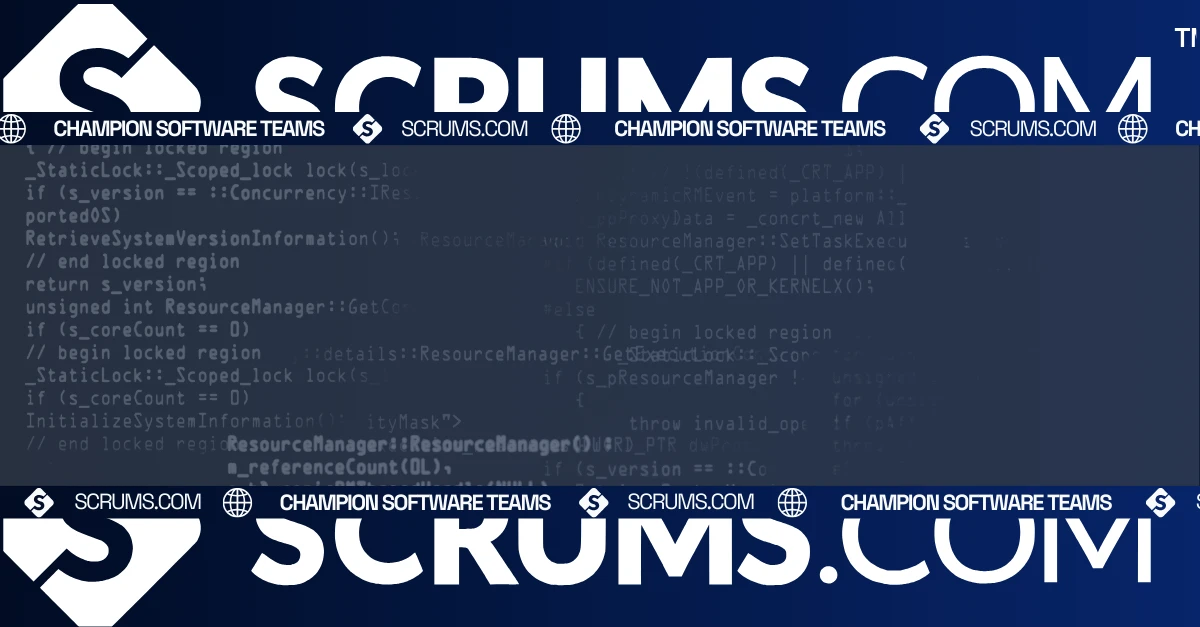Hire Perl software developers
Scrums.com's 8,500+ software developer talent pool includes experts across a wide array of software development languages and technologies giving your business the ability to hire in as little as 21-days.
Trusted by 400+ global companies
















What is Perl and Why It Matters for Your Business
Perl is a high-level, general-purpose programming language known for its flexibility, text processing capabilities, and support for rapid prototyping. It has been widely used in web development, system administration, network programming, and automation tasks since its creation in the late 1980s. Perl is often described as the "Swiss Army knife" of programming languages due to its versatility in handling complex tasks such as file manipulation, regular expression matching, and report generation.
Hiring a Perl developer can provide your business with expertise in building secure backend applications, automating tasks, and managing system operations. Perl's continued use in industries like finance, biotechnology, and e-commerce makes it a valuable technology for businesses looking to streamline operations and enhance web applications.
Key Benefits of Hiring a Perl Developer
Hiring a Perl developer can offer a range of benefits, particularly for businesses focused on automation, secure backend development, and system administration. Key advantages include:
- Powerful Text Processing: Perl’s unparalleled text manipulation capabilities make it ideal for data extraction, report generation, and text-based automation tasks. Perl developers can write efficient scripts to process large datasets and handle complex text manipulation with minimal code.
- Efficient System Administration: Perl is widely used for system administration tasks such as automating server management, file operations, and user management. Hiring a Perl developer can streamline administrative tasks, saving time and reducing the risk of errors.
- Custom Script Development: Perl developers can create custom scripts to automate repetitive tasks, perform system monitoring, and handle data integration. This is particularly useful for businesses that require tailored solutions for managing large-scale IT operations.
- Web Application Development: Perl is a solid choice for backend development, especially for web applications that require secure, scalable, and high-performance architectures. Perl developers can integrate dynamic web content, manage databases, and optimize backend processes.
- Cross-Platform Compatibility: Perl is known for its portability, making it a popular choice for businesses that operate across multiple platforms. A Perl developer can create cross-platform applications and scripts that run efficiently on different operating systems, including Linux, Unix, and Windows.
Core Competencies of a Skilled Perl Developer
When hiring a Perl developer, it’s important to ensure they possess the necessary skills and expertise to handle complex programming tasks, text processing, and system automation. Key competencies include:
- Proficiency in Perl Programming: A skilled Perl developer should have in-depth knowledge of the Perl language, including its syntax, modules, and regular expressions. They should also be familiar with modern Perl frameworks such as Mojolicious and Catalyst for web development.
- Experience with System Administration: Perl developers should have experience in automating system administration tasks such as file management, server configuration, and user permissions. This is essential for businesses that need to optimize IT operations and reduce manual labor.
- Text Processing Expertise: Perl is renowned for its powerful text processing capabilities. A good Perl developer should be proficient in using regular expressions and Perl’s text manipulation functions to handle complex data extraction, file parsing, and report generation tasks.
- Web Application and Backend Development: Perl developers should be experienced in building and maintaining web applications, focusing on secure backend processes, database integration, and dynamic content generation. Knowledge of frameworks like Dancer or Catalyst is a plus for web development projects.
- Automation and Scripting Skills: A competent Perl developer should be skilled in writing custom automation scripts for a variety of tasks, including data integration, system monitoring, and file management. This is crucial for businesses looking to automate routine operations and improve overall efficiency.
How Perl is Used in Modern Software Development
Despite the emergence of newer languages, Perl remains highly relevant in certain sectors of software development. Here are some of the common applications of Perl in today’s development landscape:
- Web Application Development: Perl is frequently used for backend web development, particularly in creating secure and scalable applications. Perl’s ability to integrate dynamic content, manage user sessions, and interact with databases makes it a valuable language for web services and APIs.
- System Administration and Automation: Perl’s flexibility and text-processing power make it a go-to language for system administrators. Perl developers often automate tasks such as server management, file handling, and log analysis, helping businesses maintain efficient IT operations.
- Text Processing and Data Parsing: Perl’s regular expression capabilities are unparalleled for handling complex text parsing and data extraction tasks. It is widely used in industries like finance and biotechnology for processing large datasets and generating detailed reports.
- Legacy Systems Maintenance: Many businesses still rely on legacy Perl scripts and applications. Perl developers are often hired to maintain, update, or refactor these systems to ensure continued functionality and security.
- Security and Encryption: Perl is frequently used in security-related applications, particularly for encryption, data validation, and securing backend services. Perl developers build secure, robust applications that protect sensitive data and prevent vulnerabilities.
Perl vs. Other Programming Languages: When to Choose Perl for Your Project
Choosing the right programming language is essential for the success of your software development project. Here’s how Perl compares to other languages like Python, Ruby, and PHP, and when it might be the best choice:
- Text Processing and Automation: Perl excels in text processing and automation compared to languages like Python and Ruby. Its powerful regular expressions and ability to handle complex data manipulation tasks with minimal code make it the best choice for projects involving large datasets or heavy text processing.
- System Administration: While Python is popular for system automation, Perl has a long-standing reputation for its efficiency in system administration tasks. Perl’s cross-platform compatibility and robust scripting capabilities make it an ideal choice for IT operations and automation.
- Web Development: Although PHP and Python dominate web development, Perl is still a strong contender for backend development. Its flexibility and scalability make it suitable for web applications requiring secure, high-performance architectures. For businesses maintaining legacy Perl web apps, hiring Perl developers ensures continued support.
- Legacy System Support: Perl is widely used in legacy systems, particularly in finance, telecommunications, and scientific computing. If your business relies on legacy Perl code, hiring a Perl developer is crucial to maintaining and updating these systems.
- Cross-Platform Compatibility: Perl’s ability to run on various operating systems gives it an edge over languages like PHP and Ruby when cross-platform development is necessary. For businesses operating in diverse environments, Perl ensures compatibility across different systems.
The Future of Perl Development: Trends and Insights
Although Perl’s popularity has declined with the rise of newer languages, it remains a vital technology in several industries. Here are some trends and insights into the future of Perl development:
- Increased Use in Automation: As businesses look for ways to automate repetitive tasks and optimize IT operations, Perl’s automation capabilities continue to be relevant. Perl developers will play a key role in automating system administration tasks, file management, and data integration.
- Integration with Modern Web Technologies: Perl is evolving to integrate with modern web technologies, ensuring its continued use in web application development. Frameworks like Mojolicious and Dancer offer Perl developers tools to build dynamic, scalable web applications while maintaining Perl’s speed and flexibility.
- Maintaining and Modernizing Legacy Systems: Many enterprises continue to rely on legacy Perl systems. As these systems age, there will be a growing demand for Perl developers who can maintain, update, and modernize legacy Perl codebases, ensuring business continuity.
- Perl for Secure Backend Development: Perl’s versatility and security features make it a top choice for secure backend development, particularly in industries like finance and healthcare, where data privacy is paramount. Perl developers will continue to be in demand for projects that require secure data handling and encryption.
- Text Processing in Big Data and AI: Perl’s text processing capabilities make it a valuable tool for big data and AI applications. As these fields grow, Perl developers will find opportunities to leverage the language’s strengths in data parsing, text analysis, and report generation.
How to Hire the Right Perl Developer for Your Needs
Hiring the right Perl developer is crucial to the success of your web application, automation, or system administration project. Here’s how to get started:
- Define Your Project Requirements: Clearly outline your project’s scope, including whether you need expertise in web development, system administration, or automation. This will help you identify developers with the right skills.
- Look for Relevant Experience: Choose developers with proven experience in Perl development, particularly those who have worked on web applications, automation tasks, or legacy system maintenance. Experience with Perl frameworks like Catalyst and Mojolicious is a plus for web projects.
- Evaluate Technical Skills: Ensure the developer has strong Perl programming skills, including proficiency in regular expressions, text processing, and system automation. They should also be familiar with modern Perl tools and frameworks for web development.
- Assess Communication and Collaboration: Your Perl developer should be able to collaborate effectively with your team and communicate technical concepts clearly, especially when working on complex backend systems or automation projects.
- Consider Freelancers or Development Agencies: Depending on your project’s complexity, you may opt to hire a freelance Perl developer or work with a development agency specializing in backend development and system automation. Each option offers unique advantages, so choose based on your needs and budget.
Don't Just Take Our Word for It
Hear from some of our amazing customers who are building with Scrums.com Teams.
Find Related Software Developer Technologies
Caliiburn Micro developers
.NET Core developers
Adobe PhoneGap developers
AngularJS developers
Apache Kafka developers
ASP.NET Razor developers
How to Hire Software Developers with Scrums.com
Align
Let us get to know your business. Book a free consultation and tell us about your tech talent requirements.
Review
Our teams will look at the current culture and requirements of your business and match quality tech talent that best suite your teams.
Meet
Meet your tech talent. We have a 33% acceptance rate as we pre-qualify suitable talent to ensure they meet your needs.
Kick-Off
Once we have agreed on the best way forward, we will start the contract closure process. Once that's done - We can kick-off!
Explore Software Development Blogs
The most recent trends and insights to expand your software development knowledge.










